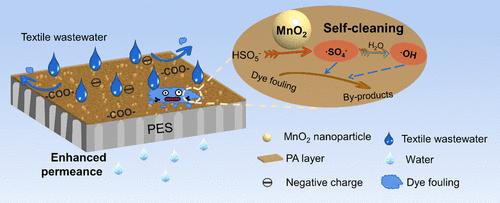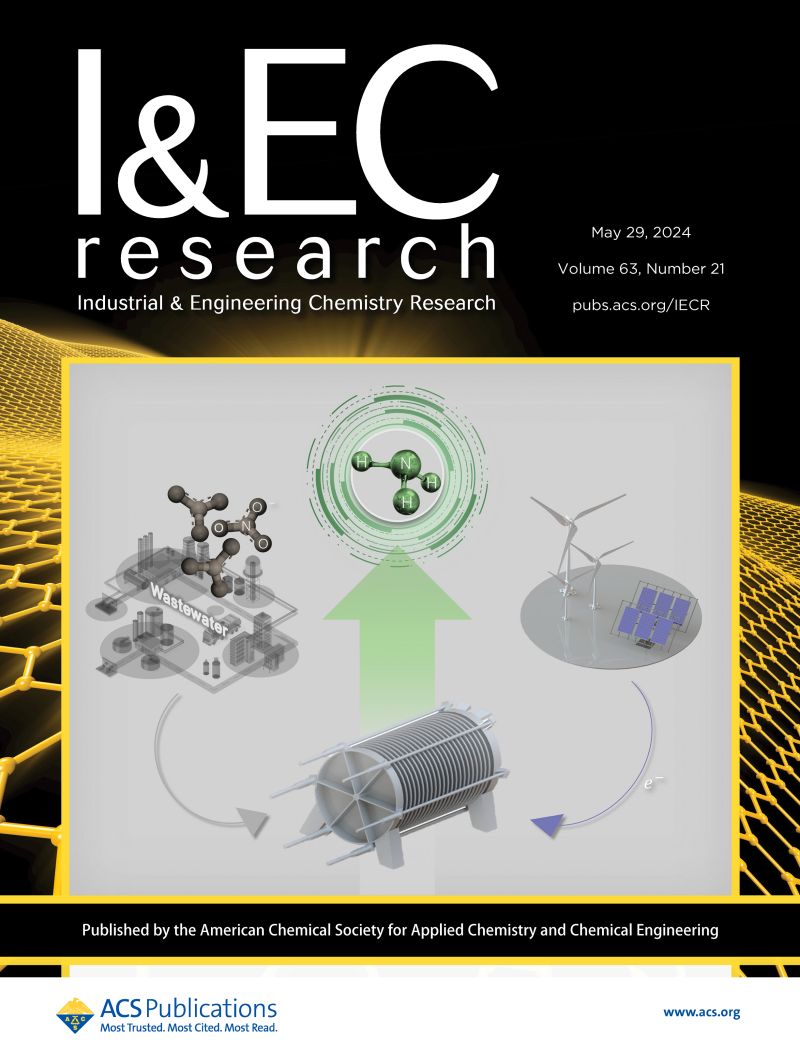Self-Cleaning Thin Film Polyamide Manganese Dioxide Nanocomposite Membrane via Peroxymonosulfate Activation
IF 3.8
3区 工程技术
Q2 ENGINEERING, CHEMICAL
引用次数: 0
Abstract
Severe surface fouling of nanofiltration (NF) has hindered its practical implementation in treating dye-containing wastewater from the textile industry. To address this fouling issue, a novel thin-film nanocomposite NF membrane (TFNx) was proposed by embedding catalytic manganese dioxide (MnO2) nanoparticles within polyamide (PA) rejection layer to realize in situ Fenton-like advanced oxidation self-cleaning. The incorporation of MnO2 nanoparticles was validated to moderately reduce the degree of cross-linking of the PA layer, thereby obtaining an enhanced surface hydrophilicity. The inclusion of MnO2 nanoparticles increased the surface hydrophilicity, resulting in a higher water permeance (TFN10 18.1 ± 0.7 L m–2 h–1 bar–1) that was 57.4% higher than that of the control thin film nanocomposite (TFC) membrane, while a high dye rejection was maintained. In addition, the presence of catalytically capable MnO2 nanoparticles in the Fenton-like reaction led to membrane self-cleaning and demonstrated a better antifouling behavior. The generation of free radicals was triggered by the addition of peroxymonosulfate (PMS). Furthermore, the impacts of operational conditions on membrane self-cleaning performance and operation stability were comprehensively investigated.

过硫酸锰活化自清洁薄膜聚酰胺二氧化锰纳米复合膜
纳滤(NF)的严重表面污垢阻碍了其在处理纺织业含染料废水中的实际应用。为了解决这一污垢问题,我们提出了一种新型薄膜纳米复合纳滤膜(TFNx),在聚酰胺(PA)排斥层中嵌入催化二氧化锰(MnO2)纳米颗粒,以实现原位芬顿式高级氧化自清洁。经验证,纳米二氧化锰颗粒的加入可适度降低 PA 层的交联度,从而获得更高的表面亲水性。MnO2 纳米粒子的加入增加了表面亲水性,从而提高了透水性(TFN10 18.1 ± 0.7 L m-2 h-1 bar-1),比对照薄膜纳米复合膜(TFC)高出 57.4%,同时保持了较高的染料抑制率。此外,在类芬顿反应中,催化能力强的 MnO2 纳米粒子的存在导致了膜的自清洁,并表现出更好的防污性能。过氧单硫酸盐(PMS)的加入引发了自由基的生成。此外,还全面研究了操作条件对膜自清洁性能和运行稳定性的影响。
本文章由计算机程序翻译,如有差异,请以英文原文为准。
求助全文
约1分钟内获得全文
求助全文
来源期刊

Industrial & Engineering Chemistry Research
工程技术-工程:化工
CiteScore
7.40
自引率
7.10%
发文量
1467
审稿时长
2.8 months
期刊介绍:
ndustrial & Engineering Chemistry, with variations in title and format, has been published since 1909 by the American Chemical Society. Industrial & Engineering Chemistry Research is a weekly publication that reports industrial and academic research in the broad fields of applied chemistry and chemical engineering with special focus on fundamentals, processes, and products.
文献相关原料
公司名称
产品信息
阿拉丁
Trimesoyl chloride
阿拉丁
Polyvinylpyrrolidone
 求助内容:
求助内容: 应助结果提醒方式:
应助结果提醒方式:


